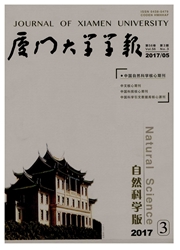

 中文摘要:
中文摘要:
大气CO2浓度升高,引起海洋酸化,使得海水pCO2、H+和HCO3-浓度增加,CO32-浓度下降,并导致CaCO3的饱和度下降.海水pCO2升高,促进某些藻类的光合作用与生长,特别是在光能不足的情况下,这种促进效应尤其明显.然而,海水酸性的增加导致钙化藻类钙化量下降,蒙受阳光UV辐射的损害增加,威胁其生存.即使非钙化藻类,如某些硅藻类和赤潮藻类,pCO2升高引起的海水酸性增加可降低其耐受高光胁迫的能力,加大光抑制,且增加其呼吸作用.因此,海洋酸化究竟会导致海洋光合固碳量增加还是减少,取决于酸化与CO2浓度升高"双刃剑"效应的平衡,也就是取决于海洋酸化正、负效应的平衡.在不可逆转的海洋酸化进程中,藻类必然进行生理调节并适应酸化带来的海水化学胁迫,由此,遗传或进化方面的变化也会发生.海洋从大气中吸收CO2的量,依赖于藻类光合作用驱动的CO2生物泵,自然也依赖于海洋酸化的正、负效应.
 英文摘要:
英文摘要:
Increasing atmospheric CO2 concentration leads to ocean acidification,raising the levels of pCO2,H+ and HCO3-and decreasing CO32-content in seawater and CaCO3 saturating state.The ongoing increase of pCO2 is known to stimulate photosynthesis and growth of some algae,especially under light-limiting conditions,due to additional energy saved from down-regulation of CO2 concentrating mechanisms.However,increased acidity of seawater led to decreased calcification of calcifying algae,threatening their survival.Even for non-calcifying algae,such as diatoms and red tide algal species,CO2-induced acidification decreases their ability to protect themselves from high light,leading to higher photoinhibition.At the same time,it enhances respiration.Therefore,ocean acidification displays double edged roles in affecting the algal physiology.Algae or phytoplanktonic cells have to regulate their physiological performance in response to the irreversible chemical changes caused by increased pCO2 and acidity.Subsequently,evolutionery adaptation would occur.The oceanic CO2 uptake,along with the ongoing ocean acidification,will depend on the possitive and negative effects of ocean acidification.
 同期刊论文项目
同期刊论文项目
 同项目期刊论文
同项目期刊论文
 Combined effects of solar UV radiation and CO(2)-induced seawater acidification on photosynthetic ca
Combined effects of solar UV radiation and CO(2)-induced seawater acidification on photosynthetic ca Motility and photosynthetic responses of the green microalga Tetraselmis subcordiformis to visible a
Motility and photosynthetic responses of the green microalga Tetraselmis subcordiformis to visible a Enhanced calcification ameliorates the negative effects of UV radiation on photosynthesis in the cal
Enhanced calcification ameliorates the negative effects of UV radiation on photosynthesis in the cal UV-A enhanced growth and UV-B induced positive effects in the recovery of photochemical yield in Gra
UV-A enhanced growth and UV-B induced positive effects in the recovery of photochemical yield in Gra CO(2)-induced seawater acidification affects physiological performance of the marine diatom Phaeodac
CO(2)-induced seawater acidification affects physiological performance of the marine diatom Phaeodac Seasonal Impacts of Solar UV Radiation on Photosynthesis of Phytoplankton Assemblages in the Coastal
Seasonal Impacts of Solar UV Radiation on Photosynthesis of Phytoplankton Assemblages in the Coastal Growth and photosynthesis of a diatom grown under elevated CO2 in the presence of solar UV radiation
Growth and photosynthesis of a diatom grown under elevated CO2 in the presence of solar UV radiation NH4+ enrichment and UV radiation interact to affect the photosynthesis and nitrogen uptake of Gracil
NH4+ enrichment and UV radiation interact to affect the photosynthesis and nitrogen uptake of Gracil Interactive Effects of Ocean Acidification and Nitrogen-Limitation on the Diatom Phaeodactylum trico
Interactive Effects of Ocean Acidification and Nitrogen-Limitation on the Diatom Phaeodactylum trico Cell Size-Dependent Effects of Solar UV Radiation on Primary Production in Coastal Waters of the Sou
Cell Size-Dependent Effects of Solar UV Radiation on Primary Production in Coastal Waters of the Sou Ocean Acidification Alters the Photosynthetic Responses of a Coccolithophorid to Fluctuating Ultravi
Ocean Acidification Alters the Photosynthetic Responses of a Coccolithophorid to Fluctuating Ultravi Impacts of UV radiation on respiration, ammonia excretion, and survival of copepods with different f
Impacts of UV radiation on respiration, ammonia excretion, and survival of copepods with different f Variation in UV irradiance related to stratospheric ozone levels affects photosynthetic carbon fixat
Variation in UV irradiance related to stratospheric ozone levels affects photosynthetic carbon fixat Physiological responses of the marine diatom Thalassiosira pseudonana to increased pCO(2) and seawat
Physiological responses of the marine diatom Thalassiosira pseudonana to increased pCO(2) and seawat Reduced Calcification Decreases Photoprotective Capability in the Coccolithophorid Emiliania huxleyi
Reduced Calcification Decreases Photoprotective Capability in the Coccolithophorid Emiliania huxleyi Measurement of benthic photosynthesis and calcification in flowing-through seawater with stable carb
Measurement of benthic photosynthesis and calcification in flowing-through seawater with stable carb Relationship of photosynthetic carbon fixation with environmental changes in the Jiulong River estua
Relationship of photosynthetic carbon fixation with environmental changes in the Jiulong River estua 期刊信息
期刊信息
